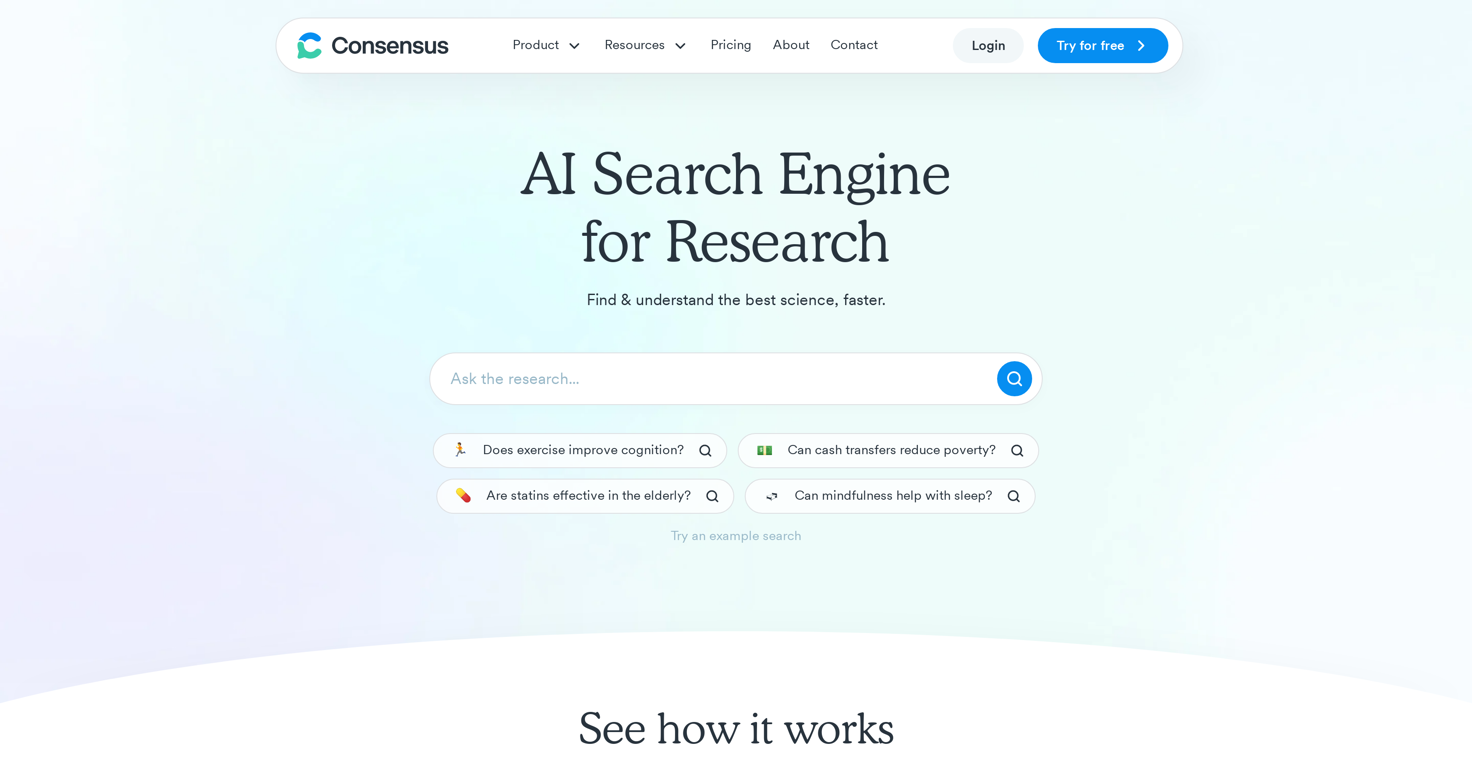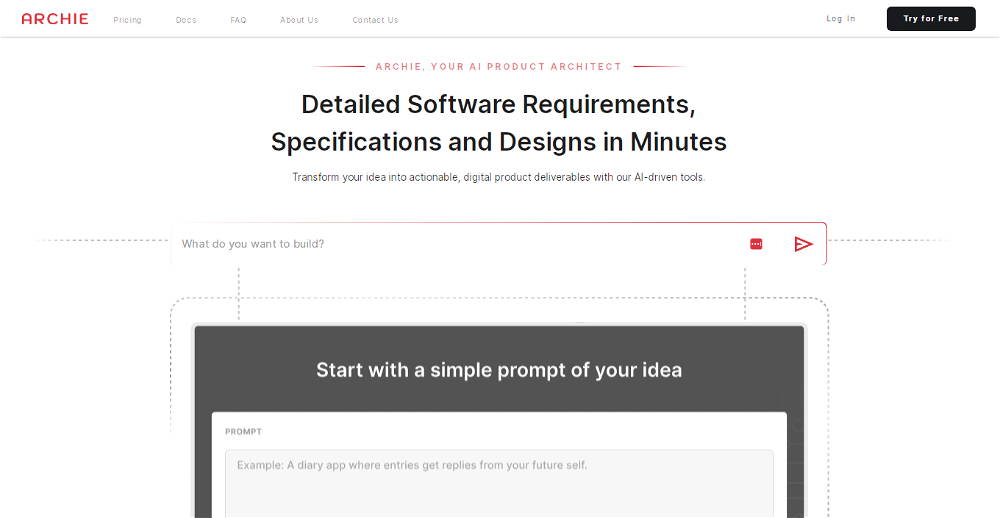What is Consensus?
Consensus is an AI-powered academic search engine that provides users with quick access to answers from scientific research. It has over 200 million academic papers in its database and can provide users with key insights and synthesis on a wide range of topics.
How does Consensus work?
Consensus uses AI and semantic search technologies to find the best answers to your questions from scientific research. It reads through peer-reviewed research papers and extracts key findings. The system uses features like Consensus Copilot and Consensus Meter to provide understanding of complex topics quickly.
What type of questions can I ask on Consensus?
You can ask a wide variety of questions on Consensus, from health-related queries like 'Are covid-19 vaccines effective?' and 'Do blue light glasses help sleep?' to academic and scientific questions across different domains. There seems to be no explicit limitation on the subject matter of the questions.
Who is the primary audience for Consensus?
The primary audience for Consensus is wide and varies from researchers, students, clinicians, and professionals to curious individuals searching for scientifically backed answers. It's also used by academic institutions, science organizations, and medical professionals who need speedy access to well-sourced, well-filtered scientific research.
What are the key features of Consensus?
Key features of Consensus include the Consensus Copilot and Consensus Meter. It also offers features like insights extraction from papers, research filtering, quality indicators, and study snapshots for accelerated understanding. It connects users directly to the original source material for credibility and has the capacity to search through over 200 million academic papers.
How does Consensus ensure the accuracy of the information?
Consensus ensures the accuracy of information by sourcing all of its data from peer-reviewed research. Each source is cited and users can always access the original research paper for verification. The system also uses AI to provide a consensus view of the scientific community's stand on a particular question.
What is the Consensus Copilot feature?
The Consensus Copilot is a feature that provides users with quick comprehension of complex topics by using AI to extract and condense key insights from scientific literature. It's designed to help users understand an entire field or topic quickly and efficiently without having to read multiple individual papers.
Can I access Consensus for free?
Yes, users can try searching on Consensus for free and can also sign up for the free beta version. Specific details about pricing or subscription models beyond the beta stage are not explicitly detailed on their website.
What is the Consensus Meter?
The Consensus Meter is a tool that gives users immediate understanding of the scientific consensus on a specific topic. It uses AI to read, analyze, and distil insights from relevant scientific literature and presents a quick snapshot of the prevailing scientific viewpoint.
Is Consensus ad-free?
Yes, the results provided by Consensus are 100% ad-free. This ensures that users get unbiased data and the most relevant information derived from scientific literature, free from commercial influences.
How does Consensus enhance research efficiency?
Consensus enhances research efficiency by using AI to comb through vast amounts of scientific research and present the key findings. It features like the Consensus Copilot, which provides a quick understanding of complex topics, and the Consensus Meter, which delivers a snapshot of the prevailing scientific viewpoint, thereby further speeding up the research process.
How is Consensus different from other search engines?
Consensus is different from other search engines in that it's heavily focused on scientific academic research, uses AI for data retrieval and synthesis, and provides direct access to original peer-reviewed research. It is ad-free, embeds unique features like Consensus Copilot and Consensus Meter and focuses on evidence-based, unbiased information.
Is Consensus useful for medical and health-related queries?
Yes, Consensus can be very useful for medical and health-related queries. It covers a broad range of topics and can provide scientifically backed answers to queries about medical treatments, disease diagnoses, the effectiveness of certain medications, and more.
What is the significance of 'Research acceleration' in Consensus?
'Research acceleration' in Consensus signifies its capacity to speed up the research process. Using AI, Consensus can quickly go through extensive research material and provide pertinent results, thereby reducing the time taken otherwise for manual searching or reading through each paper individually.
Can Consensus verify information quickly?
Yes, Consensus can verify information quickly. It provides immediate access to answers derived from peer-reviewed scientific research, enabling quick verification of information. The source of each piece of information is cited, allowing users easy access to the original research paper for verification purposes.
Does Consensus organize search results according to relevance?
Yes, Consensus organizes search results according to relevance. It uses proprietary academic tools and filters, along with various important factors like study design, sample size, and population details, to rank and deliver the most relevant research higher.
Does Consensus provide any form of article summaries or overviews?
Yes, Consensus provides insights extraction from academic papers. Using AI, it can read and interpret complex academic papers and extract the key details and findings, without the user needing to read the entire paper.
How does Consensus aid in understanding complex topics?
Consensus aids in understanding complex topics by using AI to provide synthesized insights from large volumes of academic research. With its unique features like Consensus Copilot and Consensus Meter, it provides quick understanding and direction of complex topics, thereby saving time and accelerating research.
How broad is the range of scientific domains that Consensus covers?
The range of scientific domains that Consensus covers is extensive. It can explore over 200 million academic papers across a wide array of scientific fields. Specific details about the exact domains covered are not explicitly defined, but the implication is there's a broad coverage.
Can Consensus provide insights extraction from academic papers?
Yes, Consensus can perform insights extraction from academic papers. It digs into the academic research and extracts key findings, and provides users with distilled, important insights in a rapid and comprehensive manner.












